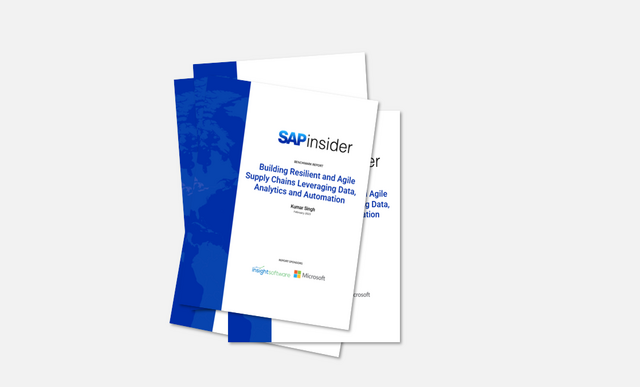In recent years, global supply chains have faced numerous challenges, yet some have proven to be more robust and resilient than others. Nevertheless, the journey ahead is likely to remain demanding for many supply chain leaders. Organizations continue to grapple with significant volatility and intricate challenges within the modern supply chain landscape. These challenges can vary—from fostering resilience to navigating increasingly complex multinational regulations, integrating environmental, social and governance (ESG) considerations into supply chain operations, and readying for an uncertain future.
The imperative to deliver bottom-line value persists, necessitating heightened agility and reduced costs, all while preserving quality, value, and customer experience. In such an ecosystem, supply chain leaders should be innovating new strategies that can enhance efficiency with greater responsiveness to customer needs. And this entails not only digitizing supply chain operations but also triggering broad-ranging changes across personnel and procedures.
Additionally, the industry is experiencing a significant surge in demand for AI, particularly as it is still in the early stages of identifying use cases and experimenting with prototypes. Moreover, integration into the SAP environment is another prominent aspect of this advancement. However, despite the potential transformative impact of such advancements on both consultants and clients, there is a noticeable shift among those already utilizing SAP. This shift involves augmenting existing systems like SAP Integrated Business Planning (IBP) and supply chain management with additional components. Customers are increasingly assessing the potential benefits and exploring alternative options rather than solely relying on SAP for all their needs. Organizations are incorporating cloud applications alongside their core systems, which has led to a more heterogeneous landscape. This diversity has resulted in a mix of SAP and other leading tech solutions, adding complexity to projects, especially when integrating cloud applications with core systems.
KPMG firms assist organizations in evaluating and enhancing their existing organizational frameworks by leveraging established methodologies, identifying avenues for enhancing agility and efficiency while mitigating risk, safeguarding revenue, and establishing a foundation for enduring innovation. As Thomas Keil, Partner Consulting, KPMG in Germany highlights, “KPMG firms positions themselves as leaders in business transformation. At KPMG, business transformation involves a holistic approach encompassing strategy, design, implementation, and a wide range of SAP services, including global rollouts. Our strategic emphasis has been on business-driven transformations, with a focus on leveraging capabilities and resources, particularly in Greenfield transformations. I believe KPMG professionals excel in projects where the business leads, as they are often more successful, requiring not only technical expertise but also a cultural shift and broad engagement.”
Additionally, KPMG firms enable organizations to continuously evolve and adapt to disruptions through cloud solutions, focusing on both the business impact and technological transformations. Keil states, “One of KPMG’s key differentiators is the structured and well-thought-out asset offered. Member firms’ integration capabilities are noteworthy as well. In our projects, KPMG professionals seek to explore multiple dimensions within transformation projects. For instance, analyzing processes like purchasing, drilling down into process taxonomy, and transitioning that to the SAP system. KPMG professionals access the SAP system directly from the process code, enabling immediate demonstration within the standard SAP environment. It remains entirely within SAP's standard framework, but the broad-ranging integration across various domains is what many clients highlight. KPMG tools and methodologies are integral parts of member firms service engagements, offered without the need for additional licenses or fees.”
Differentiating with a Powered Enterprise
Companies with robust digital capabilities have demonstrated remarkable resilience along with a growing motivation to embrace digital transformation. But when considering a shift to the cloud or adopting Software as a Service (SaaS), many focus solely on the technological aspect. However, it is more than just technology and involves achieving various business outcomes. To accomplish this, it is crucial for organizations to examine their operating models comprehensively, encompassing people, processes, data, controls, and technology, which should align synergistically to achieve the desired outcomes.
To enable organizations to transform their business functions, KPMG firms have designed a suite of proprietary tools and methodologies known as Powered Enterprise. This methodology encompasses multiple dimensions. Primarily, it functions as an implementation methodology, addressing diverse facets and the complete process taxonomy crucial for standard business operations. While it does not encompass every aspect, it furnishes a diagnostic overview and scrutinizes specific areas such as SAP implementations and supply chain applications.
Keil asserts, “Powered Enterprise provides a direct pathway to advanced organizational design, cutting-edge technology, and operational models. It facilitates the creation of fully redesigned business functions based on best practices, empowering continuous transformation for the future. With Powered Enterprise, you can establish business functions that remain relevant, agile, and responsive, addressing common challenges faced by modern businesses, such as improving functional performance, facilitating adoption of new work methods, ensuring future-ready processes, and enhancing control over risk and regulation.
Powered Supply Chains
When embarking on supply chain transformation, organizations often look for results while minimizing risk, along with streamlined and compliant technology. From supply chain initiatives focused on customer experience metrics, responding to a supply continuity issue to product movements, organizations often need a guided process with supply chain assets and accelerators to jump start their supply chain transformation.
KPMG Powered Supply Chain, enabled by SAP S/4HANA, is designed to provide businesses with the strategy and tools necessary to establish connections across their entire organization, from front-end to back-end, leveraging customer insights for demand forecasting, thus enabling the mitigation of disruption impacts and cost management. With access to industry best practices derived from extensive collaboration with numerous organizations, customizable pre-configured tools and processes facilitate the swift implementation of supply chain technologies tailored to individual requirements.
KPMG professionals have an in-depth comprehension of processes but also their holistic approach that goes beyond technology, and seeks to address personnel, roles, service offerings, and other deliverables. This combination resonates positively with clients, who appreciate the added value KPMG firms can bring to projects.
Moreover, in terms of capabilities, there is the potential to address ESG considerations within SAP. While SAP has made initial strides in offering products to support ESG processes, there are opportunities for growth and client demand in this area. A key focus area for KPMG is the public cloud aspect, as there is a growing trend towards migrating from on-premise or private cloud solutions to public cloud environments. Recognizing the benefits of standardization and harmonization, the company is investing in expanding its capabilities and service offerings in this domain to meet client needs effectively.
Case in Point: S/4HANA Implementation at EnBW
EnBW, the energy company headquartered in Karlsruhe, Germany, wanted SAP S/4HANA to take over from the R/3 system, which had been in use for over 20 years. The reorganization process targeted over 300 companies with a user base exceeding 10,000 individuals. The company wanted to create a system landscape that provided sustainable and flexible support while reducing complexity across the board and standardizing processes. The aim was to build a new platform that made it possible to use innovations quickly and implement digitalization initiatives. EnBW chose KPMG in Germany as their advisor for the transformation project.
The project unfolded in four phases: analysis and future requirements assessment, prototype development and live deployment, large-scale implementation with a focus on EnBW's core business, and final rollout to other EnBW companies. Within three years, approximately 300 companies transitioned to the new ERP system. Change management, emphasizing communication and user skill development, played a pivotal role in ensuring a smooth transition during the final phase.
In KPMG engagements, especially in SAP projects, member firms operate as a ‘trusted advisor’ with their clients. It is a collaborative effort where both parties have roles to play, and the success of the project hinges on this relationship. As Keil emphasizes, “The EnBW project exemplifies this collaboration. Despite the challenges, delivering projects on time and within budget, as we did with EnBW. This commitment to our promises significantly contributes to the client's satisfaction and overall project success.”
What it means for SAPinsiders
Emphasize business transformation over technology: Shift focus from viewing projects solely as technology or IT endeavors to understanding them as business transformation initiatives. Recognize that success rests on effectively navigating organizational change and bringing people along in the transformation journey.
Invest in change management: Acknowledge the critical role of change management in project success. Recognize that failure often stems from an organization's inability to adapt to new processes and ways of working. Prioritize investing in change management initiatives to facilitate smoother transitions and ensure stakeholder buy-in, even if it requires overcoming cultural reluctance.
Prioritize roadmaps: Given the multitude of initiatives and limited resources, prioritize projects based on clear value and feasibility. Develop comprehensive roadmaps that outline clear priorities and timelines, ensuring alignment with organizational objectives. Avoid tackling everything simultaneously, instead, focus on initiatives that offer the most significant value and impact.
Engage and support operational staff: Recognize that operational staff like warehouse personnel and procurement staff are vital stakeholders in transformation efforts. Acknowledge the challenges of balancing day-to-day responsibilities with project demands. Provide support and resources to ensure their involvement in transformation initiatives without disrupting critical business operations. Foster a culture of collaboration and involvement to maximize success.







